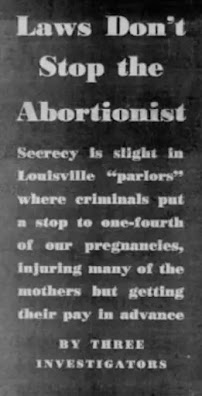 |
| Headlines on 1939 undercover C-J investigation that found abortion was commonplace in Louisville |
The stories are based on 20 cases decided by Kentucky's highest court and more than 60 stories from the Courier Journal’s archives over that period. The article also come with a warning that the stories contain graphic descriptions that may upset some readers.
"The Courier Journal found the procedure was widespread, even routine — despite penalties of up to 20 years in prison for those who provided "criminal abortions," Wolfson reports.
"One woman was beheaded after her boyfriend tried unsuccessfully to give her an abortion, then dumped her body in a field," he writes. "The remains of other women who died in botched abortions were tossed in a well, left by the side of a highway, ditched in a Louisville parking lot and abandoned in a La Grange motel room."
Wolfson includes a number of other women who experienced illegal abortions in Kentucky prior to it becoming legal and how they often suffered or died in his story. "Some women lingered for months before dying of infections, abscesses and hemorrhages," he writes.
And then he asks the question, "Will history repeat itself if the U.S. Supreme Court strikes down Roe v. Wade and lets states such as Kentucky decide whether it can be banned?" The Washington Post has a similar story from a national perspective.
Twenty-six states, including Kentucky and five bordering states, are poised to move quickly to ban abortion should Roe be overturned, according to the Guttmacher Institute, a reproductive-health policy organization that favors abortion rights. Kentucky will do so through a "trigger law" that was passed in 2019 that will immediately ban abortion in Kentucky if Roe is overturned.
Twenty-six states, including Kentucky and five bordering states, are poised to move quickly to ban abortion should Roe be overturned, according to the Guttmacher Institute, a reproductive-health policy organization that favors abortion rights. Kentucky will do so through a "trigger law" that was passed in 2019 that will immediately ban abortion in Kentucky if Roe is overturned.
Retired Louisville obstetrician Dr. Ronald Levine, 93, who began practicing 13 years before Roe v. Wade and continued to practice after, told Wolfson that when abortion was illegal in Kentucky, "Every day we would see women with infections from back-alley abortions and girls who tried to do abortions themselves with wire hangers or by douching themselves with lye."
If abortion becomes illegal again, “It won’t be as bad, but it will still be bad. Not everyone will be able to get on a plane and fly to Illinois or New York. Teenagers will still try self-abortions," said Levine, who was chairman of obstetrics and gynecology at the University of Louisville. "We will always have abortions. The only question is whether we do them safely or dangerously."
Researchers who have studied the history of abortion told Wolfson that while women with money and means will find a way to have an abortion, those without similar resources will resort to extreme methods -- like having their boyfriend hit them in the belly or finding an "underground" abortion provider. They also said it is likely that abortion medications will increasingly be sold on the black market.
Wolfson also walks through the history of abortion in Kentucky, from the 17th century to 1973. He writes about the reasons women have sought abortion over the years, including the risks involved with childbirth, social necessity and inabilities to support a child without work or family support.
As for laws to restrict abortion or even make it illegal, the Courier Journal said in an editorial: “The law never put a stop to abortions. It just made then more difficult, more expensive and more dangerous.”
The U.S. Supreme Court is expected to rule on the case of Dobbs v. Jackson Women's Health Organization by the end of June, which will determine the constitutionality of Mississippi's 15-week abortion ban, which raises the issue of whether a state can ban abortion before fetal viability. The court could do that without fully overturning Roe, by setting a stricter standard, but Justice Samuel Alito wrote in a leaked draft opinion that there is no constitutional right to abortion.
No comments:
Post a Comment